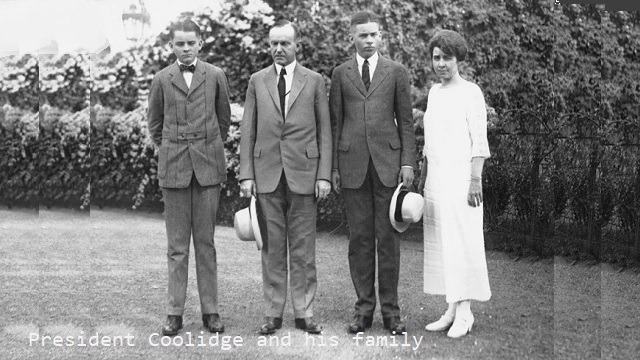Fathers and Sons

John Grondelski: This year is the centennial of Calvin Coolidge’s inauguration and recalls not only a different age for fathers and sons, but much more.
The day that Calvin Coolidge succeeded Warren G. Harding as president his son, Calvin Jr., started work on a tobacco farm. Coolidge writes, “When one of his fellow laborers said to him, ‘If my father was president, I would not work in a tobacco field.’ He replied, ‘If my father were your father, you would.’”
It’s not that Calvin didn’t love Calvin Jr., a son he would lose within a year, likely from sepsis, it’s that Coolidge believed in honest work. A father who thought a 16-year-old son should work and have a summer job was not unusual in 1923. It is today, given data that Nicholas Eberstadt includes in his study, Men without Work, of men’s flight from the workplace.
The value of earning one’s wages, of being responsible, of honest labor (including hard manual labor) were self-evident in Coolidge’s expectations for his son. We could do with a strong dose of those simple truths again.
The historical records tell us that his son’s death devastated Coolidge. But with his usual understatement, the president – who had believed his son would have made something of himself – accepted that the “ways of Providence are often beyond our understanding. . . .I do not know why such a price was exacted for occupying the White House.”
This year is the centennial of Coolidge’s inauguration, and it recalls not only a different age for fathers and sons, but much more.
His inauguration was unique: the only time a father swore in his own son as president. Vice President Coolidge was visiting his father in Plymouth Notch, Vermont when news came that Harding had died. That corner of America was still quaint enough that the notice arrived in a telegraph office eight miles away. At 2:47 AM, local justice-of-the-peace/notary John Coolidge administered the Constitutional Oath to his son by the light of a kerosene lamp. Electricity was also still a bit of a novelty in rural America.
Painters have tried to capture the moment. What’s telling is that the scene depicted in the paintings (and not just the cropped versions showing father and son) show other people gathered around and everybody – including father and son – in their “Sunday best” at 2:47 AM on a Friday.
Coolidge relates the events of that night in his Autobiography. If you have not read it, please do. It’s been a long time since the obvious humility that suffuses that book has been found in a presidential memoir. In a self-effacing way, Coolidge admits that it “has undoubtedly been the lot of every native boy of the United States to be told that he will some day [sic] be President. . . .My own experience. . .did not differ from that of others. But I never took such suggestions seriously, as I was convinced. . .I was not qualified to fill the exalted office of President.”
In retrospect, Coolidge was a better president than Harding but he confesses that, in 1920, he felt far better being nominated for the number two slot. “I could have accepted it [the presidency] only with a great deal of trepidation.” He admits, however, that when that office descended upon him unexpectedly in the middle of a Green Mountains night, he felt far more at peace with the situation because “I felt at once that power had been given me to administer it.”
He remembers his father awakening him in the middle of that night – something he usually did only when a relative died – to inform him. “Before leaving the room I knelt down and. . .asked God to bless the American people and to give me power to serve them.” He recalls the kerosene lamp and his mother’s Bible, laying on the table by his hand.
He concludes, reflecting on the people and place. In kingdoms, a father might invest a son, “but in republics where the succession comes by election, I do not know of any other case in history where a father has administered to his son the oath. It seemed a simple and natural thing to do at the time, but I can now realize something of [its] dramatic force.”
His remarks clearly show a sense of Providence leading him to that night in that place.
Many presidents since have spoken about the value of faith and family. Coolidge’s actions embodied both. His father and mother shaped a man, from boyhood to that night by light of the kerosene lamp. He reciprocated the devotion: Coolidge vacationed in Plymouth Notch, not Martha’s Vineyard. He stopped at his mother’s grave before heading off to Washington and the White House.
Regarding humility, Hubert Humphrey once said someone needs “fire in his belly” to go through the four-to-eight-plus-year slog to win and exercise the presidency. Calvin, by contrast, seemed the embodiment of his 1924 campaign slogan: “Keep cool with Coolidge.”
Coolidge’s religious roots were Puritan (his first name is a giveaway) and he grew up opposite the Union Christian Church (which was essentially Congregationalist) in Plymouth Notch. As president, he attended Washington’s First Congregational Church.
But from the perspective of a century later, the values Calvin Coolidge espoused were very much in the classical mainstream of the whole Judeo-Christian tradition: faith in God, family, and humility. They’re the kind of values Prof. Robert George wants to rekindle by his initiative to make June “Fidelity Month.”
These are things – American but also universally human things – very much worth remembering – and imitating – as this Sunday we observe Father’s Day.
AUTHOR
John M. Grondelski
John Grondelski (Ph.D., Fordham) is a former associate dean of the School of Theology, Seton Hall University, South Orange, New Jersey. All views herein are exclusively his.


Leave a Reply
Want to join the discussion?Feel free to contribute!